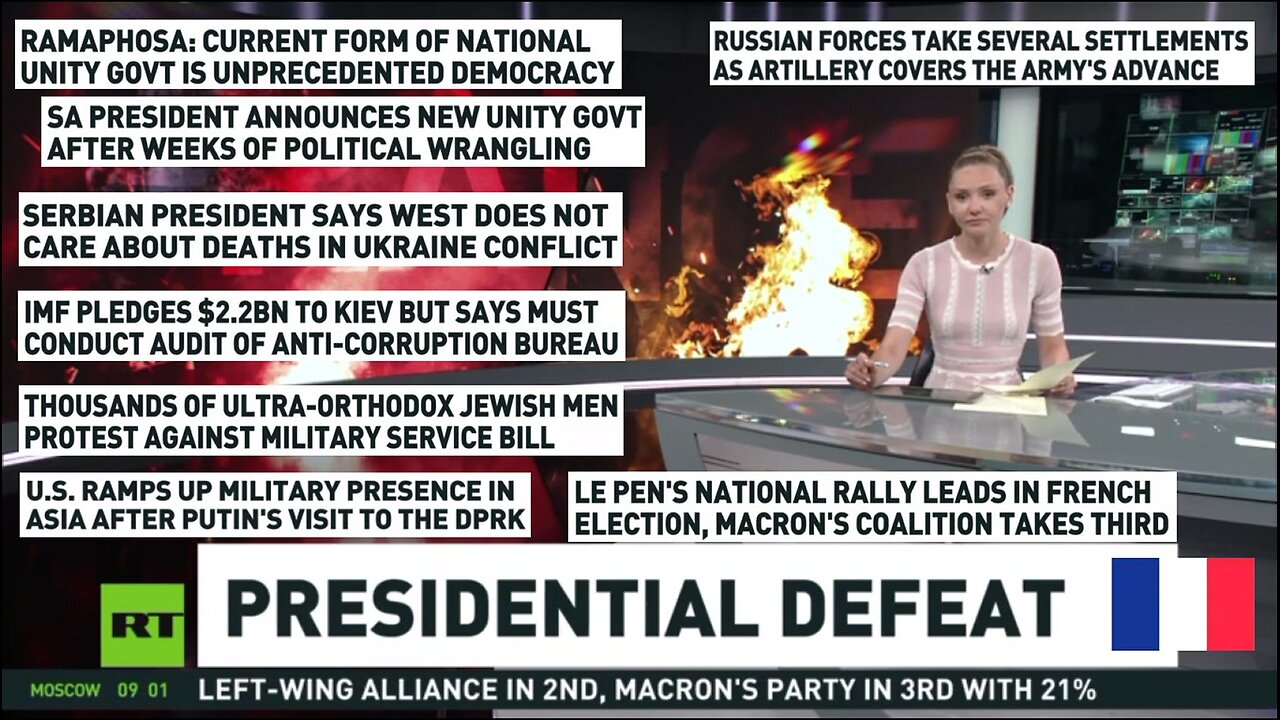Premium Only Content

RT News - July 1st 2024 France Elections, Unity S. Africa, Ukraine IMF & corruption, Israel protests
Stop press news - US military bases in Europe put on high ‘terror attack’ alert – media (see below)
Marine Le Pen's National Rally (RASSEMBLEMENT NATIONAL) has won the majority of votes in France, after a snap election was called by Emmanuel Macron last month. There were celebrations across France with fireworks and bonfires and the "usual" waste bins set ablaze as the police tried to disperse the crowds. (I don't know why they were trying to disperse the crowds?) The police used tear gas and other anti-citizen dispersion force which wound the elated crowds up. Marine Le Pen gave an announcement speech, saying "the people have spoken"
After that Gabriel Attal (Macron's Prime Minister) gave a speech saying "we must stop the Rassemblement National from dominating and running the country with their nefarious plan it has in mind" (Recall something similar after the historic Rochdale election and Rishi Sunak as he inferred that George Galloway was responsible for all the problems that ail Britain simply because he was elected !! See https://twitter.com/HussainShafiei/status/1763644589393465560 &
this video from Neil Oliver explains it much better https://youtu.be/DT0Ro3TiHWA)
Rachel Marsden explains more about the yesterday's vote.
----
In South Africa the government will be a new start for the country, "unprecedented" with so many different parties properly represented and with a say - the country may be of true unity, for the first time in modern history. Noluvuyo Kunge explains more (it's complex). Even the cabinet will comprise of members of the various parties - not just "the ruling one" but some key areas will remain under Pres. Ramaphosa's control. Sipho Seepe (former .gov advisor) gives comments.
----
Ukraine: "Nobody in the west cares about peace - it's not them or their families dying" that's according to Pres. Vucic of Serbia who is complaining that the China peace proposals are not even being considered.
- In the Donetsk republic, Russian forces progress and take several settlements.
- At the weekend the IMF approved a $2.2 billion loan to Ukraine (see https://rumble.com/v54ixnu-rt-news-june-29-2024-late-belgrade-serbia-israeli-embassy-attack..html for more detail) One of the conditions for the loan is that Ukraine's state corruption needs to be addressed. Roman Kosarev reports. Ukraine was the first country to receive a loan whilst it was at war https://www.bbc.com/news/business-65034765
----
In Kenya, protests continued all last week and weekend, protesting IMF loans and a finance bill proposed by Pres. Ruto. Even though he rescinded the bill, the protests continued about dealings with the IMF. 23 people died in the protests at the hands of the police and hundreds were injured.
Martin Dolzer (former German politician) talks about "IMF dependency"
----
The US, South Korea and Japan are conducting their first trilateral military exercises called "Freedom Edge" (see https://www.navy.mil/Press-Office/News-Stories/Article/3819224/trilateral-statement-first-execution-of-multi-domain-japan-rok-us-exercise-free/) North Korea isn't happy about this as this has followed immediately after the announcement of defence-only, strategic partnership documents signed between DPRK and Russia, during Pres. Putin's visit to North Korea and Pres. Kim Jong-Un. Prof. Victor Gao comments, hoping that the US and it's allies will start to promote peace, not more war.
----
Protests in Israel turned violent last night as the crowds clashed with "security forces" (police?). They are protesting about conscription of the Ultra-Orthodox Jewish population of Israel who have until now been excluded from the draft. These protest could have political ramifications which call for elections.
-
Short take: Paris burns as the National Rally party takes the lead in the French legislative elections. With President Macron’s defeat on the cards, the nation’s Prime Minister issues a stark warning. South Africa’s president names a new coalition cabinet, with the opposition making its debut in the new government after weeks of political wrangling. Ukraine is told by the IMF to crack down on its rampant corruption as the financial institution releases another tranche of aid to Kiev from its bailout package.
Below A) US military bases in Europe put on high ‘terror attack’ alert
1) Zelensky outlines model for talks with Russia
2) National Rally set for historic election victory in France
3) Hungary’s Orban announces new EU Parliament alliance (plus extras)
4) French authorities accused of ‘social cleansing’ before Olympics
5) US to unblock bomb shipments to Israel
6) (reposts) Fewer and fewer Westerners are buying the ‘Atlanticism’ idea NATO
==================
A) US military bases in Europe put on high ‘terror attack’ alert – media 1 Jul, 2024 04:25
The sites that have reportedly increased their security include the US European Command headquarters in Germany
All American military bases in Europe have been placed on high alert due to a potential terrorist threat against the facilities or personnel, several US media outlets reported on Sunday, citing sources at the Pentagon.
“There is credible intel pointing to an attack against US bases in Europe over the next week or so,” an unnamed official told Fox News.
According to the source, different installations, including the army garrison in Stuttgart, Germany, which hosts the US European Command, increased their threat posture to the so-called Force Protection ‘Charlie,’ which “applies when an incident occurs or intelligence is received indicating some form of terrorist action or targeting against personnel or facilities is likely.”
A threat level of this kind has not been activated “in at least 10 years,” a US official stationed at one of the bases told CNN, adding that it is generally applied when the military faces an “active-reliable threat.”
The US Army operates a system called Force Protection Condition (FPCON), which is designed “to counter terrorists or other hostile adversaries." Its threat levels are designated as Normal, Alpha, Bravo, Charlie, and Delta, with Charlie and Delta being the highest states of alert.
A spokesperson for US European Command Commander Dan Day declined to comment on the exact nature of the threat, saying that the Pentagon is “constantly assessing a variety of factors that play into the safety of the US military community abroad” and takes extra steps to ensure the safety of the service members.
“USEUCOM constantly monitors the security environment to ensure its personnel are informed and best postured to assure the safety of their individual person, family, and loved ones. As always, USEUCOM advises personnel in the European theater to remain vigilant and stay alert at all times,” he added, as quoted by CNN. https://edition.cnn.com/2024/06/30/politics/us-military-bases-europe-alert/index.html
While the details of what has triggered the alert remain unclear, European authorities have reportedly warned of a potential terrorist threat amid the ongoing soccer championship in Germany and the upcoming Olympic Games in France.
German authorities have deployed over 500 international police officers to assist with security during the tournament, with Interior Minister Nancy Faeser saying at the time that the country was preparing “for all conceivable dangers, from Islamist terror to violent criminals and hooligans.”
The French government has raised the national security system to the highest level as well, saying that officials are “actively monitoring terrorist threats from organized groups and radicalized individuals.”
https://www.rt.com/news/600234-us-military-bases-in-europe/
==================================
1) Zelensky outlines model for talks with Russia 30 Jun, 2024 23:02
Intermediaries could help reach a lasting settlement with Moscow, the Ukrainian leader said
Kiev does not rule out future peace talks with Moscow but they can only be held through intermediaries, Ukrainian leader Vladimir Zelensky told the Philadelphia Inquirer on Sunday. He suggested that the format used to broker the 2022 Black Sea grain deal could be useful for this purpose.
Kiev has previously refused to accept Russia’s terms as a basis of talks and accused Moscow of being incapable of good-faith negotiations. In late 2022, Zelensky even issued a decree, proclaiming the “impossibility” of holding talks with Russian President Vladimir Putin.
Moscow, meanwhile, has maintained that it is ready to restart negotiations but only if Kiev renounces claims on the territories that have been acquired by Russia during the conflict. In autumn 2022, four former Ukrainian territories – the two breakaway Donbass republics and the regions of Kherson and Zaporozhye – formally joined Russia following a series of referendums. Ukraine has never recognized the voting results and continues to lay claim to these regions, as well as Crimea, which joined Russia following a similar referendum in 2014.
In his interview with the Philadelphia Inquirer, Zelensky said that Ukraine “can find a model” for a potential settlement with Russia. He pointed to the deal brokered two years ago by Türkiye and the UN that allowed the establishment of a corridor for agricultural exports from Ukrainian ports.
According to Zelensky, Ankara and the UN had signed separate agreements with Moscow and Kiev. “It worked,” he said, adding that the grain corridor then existed “long enough.”
Moscow and Kiev were close to reaching another grain deal in March, but Ukrainian negotiators abruptly walked away after two months of talks, according to Reuters.
Agreements on “territorial integrity, energy and freedom of navigation” could be struck between Moscow and Kiev in the same format, Zelensky stated. He suggested that other countries could be invited to mediate.”No one should say that it is … just Europe and the US,” he said, adding that nations from Asia, Africa, and South America should participate as well and help prepare the documents that would be presented to Moscow and Kiev.
“So far, there is only this model,” Zelensky said. He stressed, however, that the final agreement should “suit” Kiev and be based on Ukraine’s terms.
Zelensky has long sought to promote his own 10-point “peace formula,” most recently during the summit in Switzerland on June 15-16, which Russia did not attend. Moscow has flatly rejected Zelensky’s terms, insisting that the status of its newly acquired territories is non-negotiable. Putin further demanded in June that Kiev withdraw all troops from the parts of the four Russian regions it currently controls.
According to Putin, Ukraine must also renounce its plan to join NATO and become a neutral country, as well as limit the size of its army.
Despite rejecting Russia’s terms, Kiev has recently been signaling its willingness to end the fighting. In June, the deputy head of Vladimir Zelensky’s office, Igor Zhovkva, said that Ukraine wanted “peace as soon as possible.” Zelensky himself said last week that Kiev did not want to “prolong the war” and make it “last for years.”
https://www.rt.com/russia/600232-zelensky-model-talks-russia/
=====================================
2) National Rally set for historic election victory in France – exit poll 1 Jul, 2024 00:50
The right-wing party is projected to win the first round of the snap parliamentary election
The right-wing National Rally (RN) party is set to win the first round of the French snap parliamentary elections held on Sunday, exit polls show. The result is a stunning defeat for President Emmanuel Macron and his centrist Together (Ensemble) coalition
Macron called for an early vote following the poor performance of his Renaissance Party during the European Parliament election last month, when RN led by Jordan Bardella won the most seats allotted to France.
According to the projections released on Sunday night by pollsters Ipsos and Talan, RN and its allies are leading with 33.2% of the vote, followed by the left-wing New Popular Front bloc (28.1%). Macron’s coalition is third with 21%. The turnout rate was estimated at 65.5%, the highest France has seen in four decades.
According to the projections by Radio France Internationale (RFI), RN is poised to secure between 230 and 280 seats in the 577-member National Assembly, while an estimate for Macron’s bloc is between 70 and 100 seats.
RN supporters celebrated their win, as party leaders have urged them to “mobilize” for the second round of voting on July 7.
“The French people have almost wiped out the Macronist bloc,” said Marine Le Pen, RN’s former long-time leader who currently leads the party’s faction in parliament. “The second round will determine the [final] outcome,” she added, stressing that RN needs to win an absolute majority in order for Macron to nominate Bardella for prime minister.
Macron reacted to the upset by urging voters to “block the far right” and form a coalition to prevent RN from controlling the parliament.
“The time has come for a broad, unequivocally democratic and republican alliance for the second round,” Macron said on Sunday, noting that the high turnout has demonstrated “the importance of this election for all our compatriots and the desire to clarify the political situation.”
Prime Minister Gabriel Attal said that “not a single vote should go to National Rally,” arguing that the country “must stop” the right from gaining an absolute majority.
New Popular Front leader Jean-Luc Melenchon described Sunday’s results as a “heavy and undisputable” defeat of Macron’s alliance, but also urged the French people to unite against RN.
https://www.rt.com/news/600233-national-rally-set-historic-victory/
====================================
3) Hungary’s Orban announces new EU Parliament alliance 30 Jun, 2024 16:12
Three parties have created the Patriots for Europe to secure more influence for right-wing leaders
Hungarian Prime Minister Viktor Orban has announced the creation of a new EU Parliament alliance, in cooperation with right-wing parties from Austria and the Czech Republic. The announcement comes a day before Budapest takes on the rotating six-month EU presidency.
The new group, presented as “Patriots for Europe” comprises Fidesz, the party led by Orban; the Czech Republic’s largest opposition bloc, ANO, chaired by the country’s former prime minister, Andrej Babis; and the Austrian Freedom Party (FPO), headed by Herbert Kickl.
“Today we are creating a political formation that I believe will very quickly become the largest faction of the European right-wing,” Orban said during a press briefing which was also attended by Babis and Kickl. The Hungarian leader expressed hope that the alliance would dominate the right of the EU’s political spectrum.
The bloc's policies must be altered in accordance with the results of the latest European Parliament elections, according to the Hungarian leader, who stressed that the current parliamentary groups will inevitably split.
The results of the election carried out on June 9 revealed that citizens across the 27-nation bloc had mostly shifted away from the left, although the performance of the right-wing and conservative parties varied from country to country. The ruling coalitions in Germany, France and Italy were effectively trounced by the right.
Orban’s Fidesz won 11 seats in the EU parliament, while FPO and ANO have six and seven seats respectively, with all three parties becoming strongest in their countries' elections.
In a statement to the media, the leaders of the three parties expressed hope that the new group would be joined by many other European parties in the coming days.
Hungary is set to take over the presidency of the Council of the European Union on July 1 and will remain in charge until the end of the year. During the period, Hungarian diplomats will chair meetings in Brussels and shape the EU’s political agenda.
Orban has faced sharp criticism in the EU for pursuing policies that run counter to those of Brussels. Since the beginning of the Ukraine conflict in 2022, Budapest has refused to provide weapons to Kiev, calling for a diplomatic solution instead, and has maintained economic ties with Russia. The prime minister had previously said that the results of the election had won time for the bloc and “slowed the train hurtling towards war.”
https://www.rt.com/news/600219-hungary-austria-czech-parliament-group/
=======RELATED from 19 Jun, 2024
Hungary unveils MEGA slogan for EU presidency
Budapest aims to ‘Make Europe Great Again’ when it takes the reins next month
Hungary has revealed that the slogan for its upcoming presidency of the European Union will be ‘Make Europe Great Again’ (MEGA).
Observers immediately noted the similarity to the ‘Make America Great Again’ (MAGA) motto deployed by Donald Trump during his successful US presidential campaign in 2016.
Hungary is set to take over the presidency of the Council of the European Union on July 1 and will remain in charge until the end of the year. During the six-month period, Hungarian diplomats will chair meetings in Brussels and shape the EU’s political agenda.
Hungary’s minister for European Union Affairs, Janos Boka, told a press conference on Tuesday that the slogan refers to a proactive presidency and aims to show that “together we are stronger than apart,” according to local media.
Boka downplayed the similarity of Hungary’s motto to Trump’s, joking that “I am not aware that Donald Trump has ever wanted to make Europe great,” according to Agence France-Presse.
Hungary is taking over the EU reins in “a very difficult environment,” he added, citing “a war in our neighborhood” in reference to the Ukraine conflict. He also cited illegal immigration as another of the most pressing issues the region must deal with.
Boka went on to say that “we should be allowed to remain who we are when we come together,” according to Politico.
Hungarian Prime Minister Viktor Orban has faced criticism in the EU for pursuing policies that run counter to those of Brussels.
Since the start of the Ukraine conflict in 2022, Budapest has refused to provide weapons to Kiev, calling for a diplomatic solution instead, and has maintained economic ties with Russia.
Earlier this year, Orban flew to US to meet with Republican presidential frontrunner Trump. Following the talks, the Hungarian prime minister claimed that Trump had shown himself to be “pro-peace.” That stance puts him in alignment with Hungary, unlike the current US administration and many EU members, Orban added.
Trump, in turn, described Orban as a “fantastic” leader.
Hungary has also faced criticism in the EU for following its own migration policy in an apparent contradiction with the bloc’s rules. The European Court of Justice (ICJ) imposed a €200 million ($216 million) fine on Budapest last week for restricting access to international protection procedures and illegally removing third-country nationals.
Defending his stance on the Ukraine aid and immigration Orban has argued that his policies aim to defend the interests of the Hungarian people.
https://www.rt.com/news/599558-hungary-mega-slogan-eu-presidency/
==========RELATED from 14 Jun, 2024
Hungary threatens EU over ‘insane’ migrant fine – media
The bloc’s top court has imposed a €200 million penalty on Budapest for “deliberately” violating refugee laws
Hungarian Prime Minister Viktor Orban has threatened Brussels with retaliation after an EU court slapped Budapest with a €200 million ($216 million) fine over its asylum policy, according to national media.
The European Court of Justice (ICJ) imposed the penalty on the Orban government on Thursday, accusing it of “deliberately avoiding” compliance with the bloc’s refugee laws. The ICJ also ruled that Budapest must pay an extra fine of €1 million a day until it changes its policies.
Shortly after the ruling was announced, Orban took to social media to describe it as “outrageous and unacceptable.”
“It seems that illegal #migrants are more important to the Brussels bureaucrats than their own European citizens,” the prime minister said in a post on X (formerly Twitter).
Orban also reportedly threatened retaliation in an interview with Radio Kossuth on Friday.
“We’ll figure out a way, so it hurts Brussels more than it hurts us,” the leader said, without elaborating, according to Hungarian news outlet Liner.hu and Bloomberg.
Obran described the fine as “a huge amount” and claimed that it was unprecedented. “It’s just insane,” Liner.hu quoted the prime minister as saying.
The ICJ ruling relates to a 2020 judgement that found that Hungary had restricted access to international protection procedures, unlawfully detained asylum seekers in transit, and illegally removed third-country nationals. Hungary has since closed transit zones but otherwise has not complied with the ruling, which “constitutes a serious threat to the unity of EU law,” the court said in a statement.
Hungary has taken a hard stance on migrants from outside the EU since the number of daily arrivals more than quadrupled during the migrant crisis of 2015, which saw over a million people arrive on the continent, mostly from Syria and Afghanistan. In September and October of that year, Hungary put up fences at its southern borders with Serbia and Croatia.
The standoff comes as Hungary is set to take over the EU presidency on July 1. Orban’s government has also consistently criticized the Western approach to the Ukraine conflict. Budapest has opposed NATO’s funding and arming of Ukraine, as well as the sweeping sanctions on Russia, instead calling for a ceasefire and diplomatic solution.
https://www.rt.com/news/599293-hungary-threatens-eu-migrants-fine/
==================================
4) French authorities accused of ‘social cleansing’ before Olympics 30 Jun, 2024 20:12
A group of NGOs has accused the government of forcibly removing the homeless from Paris ahead of the 2024 Summer Games
The number of forcible eviction operations launched against squatters and people sleeping outside in the French capital has rapidly grown over the past year, more than 80 NGOs said in a report, blaming the practice on the upcoming Olympic Games which Paris is about to host.
Orders issued by the local and regional authorities allowing the forced dislodgement of squatters have more than tripled over the past three years in the Paris region, one such group monitoring evictions said, according to France 24. The group’s data show that there were only 15 such removals between May 2021 and April 2022, while between May 2023 and April 2024, there were almost 50.
An umbrella group called Le Revers de la Médaille (The Other Side of the Medal) claimed that authorities in Ile-de-France – the region that includes Paris and its suburbs – have a particularly “high propensity” to resort to such measures. It also accused the French government of what it called “social cleansing.”
“This acceleration in the pace of evictions and the offering of temporary housing coincides with the arrival of the Olympics,” Theo Ferignac, an activist with Law Access Collective, told France24. “These figures clearly show the desire to have as few homeless camps as possible in Paris this summer.”
According to France24, the authorities launched at least three major forced eviction operations in the Paris suburbs between April 2023 and April 2024 – each involving the displacement of hundreds of people, including the homeless, squatters and migrants.
The people who are displaced are encouraged to take buses provided by the authorities to move to other parts of France, the broadcaster reported. There, they are often housed in temporary reception centers with a maximum capacity of 50 people for a period of some three weeks. After that, they are just told to leave these shelters as well, France24 reported.
According to The Other Side of the Medal, some 3,958 out of the 6,000 homeless and squatters living in Ile-de-France in 2023 were moved to temporary reception centers in other regions. The practice caught the attention of the UN Special Rapporteur on the Right to Housing, Balakrishnan Rajagopal. “How does France justify this?” he wrote on X (formerly, Twitter) in April.
The French authorities have consistently denied that the evictions had anything to do with the Olympics. “This emergency accommodation policy aims to spread the burden across the country ... Operations of this type are carried out regularly, it's not dictated by the Olympic and Paralympic agenda,” French Sports Minister Amelie Oudea-Castera said in March.
The Paris mayor’s office pointed to the overburdened emergency accommodation system in the French capital. The number of people without accommodation in Paris has grown by a “worrying” 16% since 2023, it told France24.
Other regions did not appreciate the government’s policy either. “It's more a case of displacing the problem rather than solving it,” said Strasbourg's deputy mayor Floriane Varieras. “The problem of homelessness is not going to be solved just by ‘regional temporary shelters’.”
https://www.rt.com/news/600231-french-authorities-social-cleansing-olympics/
=======================================
5) US to unblock bomb shipments to Israel – Axios 30 Jun, 2024 14:56
The IDF will receive a large batch of 500-pound bombs in two weeks, the outlet’s sources claim
The US has decided to release a shipment of 1,800 bombs to Israel that was suspended several months ago amid concerns over destruction in the Gazan city of Rafah, Axios reported on Thursday.
According to unnamed US and Israeli officials who spoke with the news site, the administration of US President Joe Biden is willing to send a batch of 500-pound (226kg) bombs that were put on hold in April. At the time, US Defense Secretary Lloyd Austin cited Israel’s failure to heed warnings that it “shouldn’t launch a major attack into Rafah without accounting for and protecting the civilians that are in that battle space.”
Axios suggested the unfreezing means the US is now less worried that Israel could use those bombs in Gaza, as it seeks to improve relations with its key Middle East ally, which had been strained since the start of the Israel-Hamas war last October. The bombs are reportedly due to be delivered in two weeks, after Israel’s operation in Rafah is over.
US and Israeli officials are still in talks on another part of the shipment that includes 1,800 2,000-pound (900kg) bombs, the report said. Axios also noted that negotiations on releasing arms to Israel were delayed Prime Minister Benjamin Netanyahu’s public jabs at Washington on the matter.
On Friday, Reuters reported that since the start of the Israel-Hamas war, the US has provided Israel with a total of 14,000 of the 2,000-pound bombs, 6,500 500-pound bombs, 3,000 Hellfire missiles, and other munitions. Washington has also sent $6.5 billion in security assistance since October 7.
The hostilities between Israel and the Gaza-based militant group Hamas have so far claimed the lives of more than 37,000 Palestinians and 1,400 Israelis, while causing unprecedented destruction and a humanitarian crisis in Gaza.
https://www.rt.com/news/600225-us-israel-bombs-shipment/
======================================
REPOST 19 Jun, 2024
6) Fewer and fewer Westerners are buying the ‘Atlanticism’ idea
A recent poll has shown a growing number of people in the US and Western Europe are tired of NATO’s professed goals
As a political de-facto entity, the post-Cold War West has always struggled to articulate a common purpose. The underlying cause of this difficulty is that the real existing (as opposed to the ideologically imagined) West – despite appeals to historical, cultural, and value commonalities – is defined by geopolitics. It emerged out of World War II as a sphere of Cold War US domination and hegemony, especially in Western Europe. The declared purpose – subservience to US empire? This is not the kind of thing that lends itself to open acknowledgement.
The reach of this American empire, dating back to at least 1823 – the year of the original if somewhat casual announcement of the Monroe Doctrine – has, of course, not been restricted to this West. Ask those it bruised, bought, subjugated, and often killed in South America, Africa, Asia, and Oceania. But the West is special, in that it holds a particularly important and privileged position. Some American strategists – such as the late, Polish-born Zbigniew Brzezinski – have made a fetish out of arguing that without Ukraine, Russia cannot be an empire. While it is by no means clear that post-Cold War Russia wants an empire (not the same as a sphere of influence), it is certain that the US cannot be one without its hold over Europe – that is, the Atlantic edge of the Eurasian ‘heartland’.
And yet, when the Cold War ended, there was no conceivable good security reason for European states to remain subservient to the US. The Soviet Union and its Eastern European military alliance – the Warsaw Pact, an organization that President Joe Biden can now only remember as “that other outfit” – were gone, and the EU, with all its flaws, could have provided an institutional basis for establishing an autonomous European power bloc second to none in the world.
There would have been no need for abrupt economic or, for that matter, political disruption either. Ideally, Europe could have maintained a cooperative-competitive relationship with the US, while gradually but persistently transforming it into one between equals. Now, a third of a century after the end of the Soviet Union, we should be living in that kind of world. If the end of the Cold War liberated Eastern Europe from Soviet hegemony, it should also have ended American hegemony in Western Europe, too. Instead, it brought that hegemony to almost all of Europe.
For Western European elites – most of all in Paris and Berlin (London would always have been a spoiler) – failed abysmally at what Bismarck called “seizing the mantle of history.” Rather than responding to a fundamental geopolitical shift with a strategy of their own and in Europe’s interests, they held tight to Washington and – with few, ultimately irrelevant exceptions – obediently followed its power-drunk elites into their ‘unipolar moment’ delusions, including catastrophic interventions in the Middle East and the expansion of NATO.
Ironically, the main result of this pusillanimous non-strategy was to produce the world of conflict and extremely high tension that we see now. If Europe had acted as a balancer between the US on one side, and Russia and China on the other, it could have made a decisive contribution to making Washington more rational, and ultimately, smoothing the inevitable transition to a multipolar world.
The Europeans could, for instance, have stopped the reckless dead-end policy of offering a NATO membership perspective to Georgia and Ukraine. They knew it was dangerous, which is why they objected at the Bucharest meeting in 2008. But then, of course, they caved. The result: Two wars, one (Georgia) short and lost, the other (Ukraine) long, ongoing, devastating, and with the real potential to go first regional and then global.
This brings us to the present. The ‘unipolar moment’ which never really was is well and truly over. Russia has the upper hand in the Ukraine conflict, that is, the single most hubristic and risky undertaking of the post-Cold War West. If in 2022, Westerners mused about how Moscow could possibly quit the war without a catastrophic loss of face, that shoe is now on the other foot. It is hard to see how the West can wind down its proxy war without suffering unprecedentedly severe damage from a combination of mutual blame-game recrimination and loss of credibility.
Against this background, the New York-based Institute for Global Affairs of the Eurasia Group geopolitical consulting firm has published a report, based on representative polling, that points to some important divergences within the West. As the authors of the report acknowledge, their sample of the West is limited to the US, France, Germany, and Great Britain, and the European states were “selected for their geopolitical influence and geostrategic importance to the US,” even though they are “not especially representative of Europe – or even Western Europe – as a whole.”
While the polls were conducted according to professional standards and much of the accompanying commentary is reasonably factual, ideological bias should also be considered. Eurasia Group is deeply in sync with American geopolitics. The dissidents’ voice this is not, as attentive readers can guess, for instance, from the grotesquely cautious phrasing of a question about Israel’s atrocities in Gaza – respondents are coyly asked if they feel that what Israel is doing ‘resembles’ war crimes. Sure, the way Al Capone ‘resembled’ a mafia don.
Yet the mainstream angle of a survey that also comes with lofty rhetoric about the ‘rules-based order’ and ‘beacons of liberal democracy’ makes signs of divergence and dissonance within the West only more pertinent. While the report covers much ground – including attitudes toward ‘democracy’, China, and Israel – two points stand out with regard to the relationship between the US and its Western European clients. First, the polls found majorities in all four countries surveyed in favor of a negotiated end to the Ukraine war. Second, they revealed that many European respondents distrust the US.
Regarding the Ukraine conflict, there “is broad transatlantic support for urging a negotiated settlement to end” it. Note the details here. These respondents are not simply articulating a desire for peace. Rather, they believe that Western governments should push Kiev to accept a compromise. Across the US and the three European countries, the three factors shaping the respondents’ positions the most are their concern to avoid “escalation to a wider regional war that draws in other European countries,” to avoid “direct war between nuclear-armed powers,” and to prevent “the further suffering of the Ukrainian people.”
Importantly, positions associated with the declared policies and propaganda of both Ukraine and Western governments did badly. Compare, for instance, 38% of American and 47% of European respondents in favor of “avoiding escalation to a wider regional war,” against 17% in the US and 22% in Europe who still believe in “fully restoring the pre-2022 invasion borders of Ukraine” (already excluding Crimea, incidentally, and thus a more moderate position than Kiev’s official war aims). And the answering options: “deterring strong autocratic countries from invading weaker democratic neighbors,” and “weakening Russia to punish it for its aggression” – classics of anti-Russian information war – found even less agreement.
Concerning European attitudes toward the US, there is a preponderant consensus – shared, as it happens by the US respondents – that Europe should either “be primarily responsible for its own defense, while aiming to preserve the NATO alliance with the United States” (the majority view) or even “manage its own defense and seek a more neutral relationship with the United States.” In France, Germany, and Great Britain, 86-93% of respondents chose one of these two options. On the other side, only 8-13% opted for “The United States should be primarily responsible for Europe’s defense.”
Clearly, many Europeans do not like their massive dependence on Washington. While many of them want a cooperative relationship, including NATO, they would prefer a Europe that could take care of itself. Others want that and, in addition, more distance from America, and while this is a minority view, those minorities are substantial. Even in Great Britain, which traditionally is especially close to the US, 17% are for more neutrality toward Washington; in Germany, 25%, and in France, once the home of Gaullism, 31%.
One reason for these attitudes is that Europeans do not trust the US very much. While a majority still believes that Washington’s commitment to its security obligations is either ‘somewhat’ (46%) or ‘very reliable’ (6%), almost as many respondents think the opposite: 36% see America as ‘somewhat’ and 10% as ‘very unreliable’. In Germany, the share of the skeptics approaches – and in France reaches – 50%.
The survey’s authors speculate that these results could reflect anxiety over a future Trump presidency or “be connected to a perception of a longer-term decline in America’s status as the sole superpower in a unipolar world.” In reality, both factors are likely to play a role. More importantly, in the long run, this is a distinction that will not make a difference. Donald Trump’s isolationism (for want of a better term) is a symptom of America’s decline. As is sometimes the case, the disruptive candidate is merely the one uncouth enough to draw the inevitable conclusions in public.
It is ironic but also telling that this survey bears the title ‘The New Atlanticism’. Ironic, because if anything, it shows that Atlanticism is tired. Telling, because it raises an obvious question: What is this rather ersatz ‘ism’, haplessly named after an ocean? The authors would probably answer that it has something to do with history, liberal democracy, individualism, the rule of law, civil society, etc. But even if we accept at face value – for the sake of argument – these simple ideological memes and Western self-idealizations, how do they add up to a relationship in which the US keeps subordinating Europe?
Indeed, these high ideals contradict the brute realities of American empire. In that sense, Atlanticism is what modern ideologies usually are – a fundamentally dishonest story rationalizing the powers-that-be. The most interesting thing about this survey is the evidence that even now, exposed to intense and systematic fearmongering, substantial numbers of Western Europeans are not fully persuaded by this story.
... " The statements, views and opinions expressed in this column are solely those of the author and do not necessarily represent those of RT. " ...
https://www.rt.com/news/599503-us-europe-poll-ideia-atlanticism/
=======
REPOST - part 2 from 14 Jun, 2024
6a) Russia and NATO are drifting towards a major war
It’s not impossible that the Ukraine conflict could eventually lead to a nuclear conflict, in which there will be no winners (By Ivan Timofeev, programme director of the Valdai Club.)
Is it possible that NATO forces could become directly involved in the military conflict between Russia and Ukraine? Until recently, such a question seemed very hypothetical given the high risks of escalation of the military confrontation between the US-led bloc and Russia into a large-scale armed conflict. But this scenario should be taken seriously now.
The direct participation of individual NATO countries or the entire bloc in hostilities could gradually spiral out of control. Crossing red lines can lead to the belief that there will be no consequences for engaging in war. The result of such movements can manifest itself at an unexpected moment and lead to a much more dangerous situation than the current one.
Strictly speaking, NATO countries have long been involved in the conflict. This takes several forms.
First, Western countries provide Kiev with substantial financial and military assistance, including increasingly advanced and destructive weapons systems. As the stockpiles of Soviet-style kit in the arsenals of the USSR’s former allies in the Warsaw Treaty Organisation have been depleted, the Ukrainian army is receiving more Western systems and ammunition. So far, mass deliveries have been limited by the production capacity of the Western defence industry and size of existing stockpiles. But if hostilities are prolonged, industrial capacity has the potential to grow. Increasing supplies are also inevitable in the event of a peaceful pause, which would allow Ukraine to prepare for a new phase of hostilities. Russia can hardly hope that the West lacks the political will and resources to increase support for Kiev. Moscow appears to be preparing for the worst-case scenario, namely a steady increase in substantial and long-term military assistance to Ukraine. In addition to the supply of arms and ammunition, this aid includes the training of personnel, help with the development of military industry and infrastructure, and the reimbursement of expenses in other areas that allow Ukraine to focus its resources on the defence sector.
Second, Ukraine receives extensive Western support in the form of intelligence, including technical data from satellites, radars, reconnaissance aircraft, etc. The information received enables a wide range of operations, from scoping the theatre of operations to the identification of specific targets. Data providers can be selective in granting the Ukrainian side access. But its use in military operations against Russia is not in doubt.
Third, military specialists who are citizens of NATO countries are involved in combat operations. Their role does not always appear to be official. They may be ‘volunteers’ or simply mercenaries, whose participation the authorities of their countries turn a blind eye to. Russian estimates put their number at around 2,000 in October 2023. Whether that is accurate or not, it’s clear that foreigners are fighting on Ukraine’s side, that their participation is systematic rather than accidental, and that at least some of them are citizens of Western countries.
Their involvement has not yet created an excessive risk of direct military confrontation between Russia and NATO. For Kiev’s Western partners, the sluggish pace of the conflict allows them to gradually improve the quality of their support for Ukraine. Cruise missile deliveries have long been commonplace. The arrival of US fighter jets is only a matter of time. The Russian army is “grinding down” the Western equipment that arrives. But foreign supplies to Ukraine also require a concentration of resources on the Russian side.
A significant escalation factor that would amplify the risk of a direct clash between Russia and NATO, could be the appearance of military contingents form bloc members on the territory of Ukraine. The prospect of such a scenario has already been mentioned by some Western politicians, although their view has not been supported by the US and isn’t an official NATO position. A number of the bloc’s leaders have distanced themselves from supporting the idea of sending troops to Ukraine.
What might trigger such a decision and how might it be implemented? The most likely factor for direct intervention by individual states or NATO as a whole would be a possible major military success by the Russian army. So far, the front has remained relatively stable. But the Moscow's military has already achieved significant local victories, increased pressure, seized the initiative, extended the offensive front and possibly built up reserves for more decisive action.
There are no signs of a repeat of last year’s Ukrainian counteroffensive. Kiev is reportedly short of ammunition, although this shortfall could be filled in the future by external supplies. Periodic attacks on Russian territory with cruise missiles, drones and artillery cause damage and casualties, but do not disrupt the stability of the front.
Moreover, such strikes embolden Russia's determination to create buffer zones, i.e. territories from which Kiev will not be able to attack targets in Russian regions.
A possible collapse of certain sections of the Ukrainian front and significant territorial advances of Russian forces towards the west is becoming more and more realistic scenario.
The fact that no deep advances and breakthroughs have occured for some time does not mean that there is no possibility in the future. On the contrary, thire probability is increasing due to the army’s experience in combat, the supply of the military-industrial complex to the front, losses on the Ukrainian side, delays in the delivery of Western equipment, and so on.
The Russian army’s ability to make such advances and breakthroughs is also increasing. A catastrophic scenario for individual Ukrainian groups is not predetermined, but it is probable. A major breakthrough of the Russian army towards Kharkov, Odessa or another major city could become a serious trigger for NATO countries to introduce the question of intervention in the conflict into practical terms. Several such breakthroughs, simultaneous or successive, will inevitably raise the issue.
Here, individual countries and the bloc as a whole face a strategic fork in the road. The first option is not to intervene and to support Ukraine only with military equipment, money and ‘volunteers’. Perhaps to admit defeat and try to minimise the damage through negotiations, thereby preventing an even greater catastrophe. The second option is to radically change the approach to involvement in the conflict and allow direct intervention.
Intervention can take a number of forms. It may involve the use of infrastructure, including airfields of NATO countries. It could mean the mass deployment of certain communications and engineering units and air defence systems, while avoiding their presence on the front line. An even more radical scenario is the deployment of a contingent of certain NATO countries on the border between Ukraine and Belarus. Finally, an even more radical option is the deployment of military contingents from NATO countries on the front line, which would probably be categorically unacceptable to the bloc.
Each of these scenarios involves a direct clash between Russian and NATO forces. Such a situation would inevitably raise the question of deeper bloc involvement and, in the longer term, the transfer of military conflict to other areas of contact with Russia, including the Baltic region. At this stage, it will be even more difficult to stop the escalation. The more losses both sides suffer, the more the maelstrom of hostilities will grow and the closer they will come to the threshold of using nuclear weapons. And there will be no winners.
These are all hypothetical options. But they need to be considered now. After all, not so long ago such significant military deliveries to Ukraine seemed unlikely to anyone, as much as the conflict itself, three years ago. Now it is an everyday reality. The dangers of movement towards a major war between Russia and NATO should be taken seriously.
(This article was first published by Valdai Discussion Club, translated and edited by the RT team.)
https://www.rt.com/russia/599286-russia-nato-ukraine-conflict/
===================
https://edition.cnn.com/2024/06/30/politics/us-military-bases-europe-alert/index.html
https://edition.cnn.com/2024/06/30/politics/us-military-bases-europe-alert/index.html
-
 LIVE
LIVE
Matt Kohrs
9 hours agoMSTR Squeezes Higher, Bitcoin To $100k & Nvidia Post Earnings || The MK Show
1,118 watching -
 LIVE
LIVE
BonginoReport
3 hours agoNikki Haley's Hatred of Tulsi Gabbard Just Made Me a Bigger Fan (Ep.90) - 11/21/24
13,003 watching -
 28:41
28:41
Professor Nez
8 hours ago🚨BLOOD on their HANDS! The Man Biden & Kamala Flew In Finally Faces JUSTICE for Laken Riley
4698 -
 1:22:22
1:22:22
Game On!
13 hours ago $3.21 earnedRussell Wilson MVP? TNF Steelers vs Browns Game of the Year!
18.9K -
 13:57
13:57
This Bahamian Gyal
13 hours agoSo, now MIKA and JOE want to work with HITLER? Sunny Hostin was right!
14.8K30 -
 59:38
59:38
The Tom Renz Show
16 hours ago"MAGA & Unity With Pastor Bernadette Smith"
8.34K1 -
 2:12
2:12
Memology 101
13 hours ago $2.35 earnedTYT's Cenk Uygur DESTROYS deluded self-proclaimed election Nostradamus over FAILED prediction "keys"
8.09K12 -
 2:11
2:11
BIG NEM
13 hours agoMeet the NATIVE Tribe Of The Balkans Nobody Talks About
4.94K2 -
 2:40:31
2:40:31
Fresh and Fit
11 hours agoAre You Smarter Than A 5th Grader? After Hours
185K77 -
 4:07:42
4:07:42
Alex Zedra
17 hours agoLIVE! Scary Games with the Girls
164K6